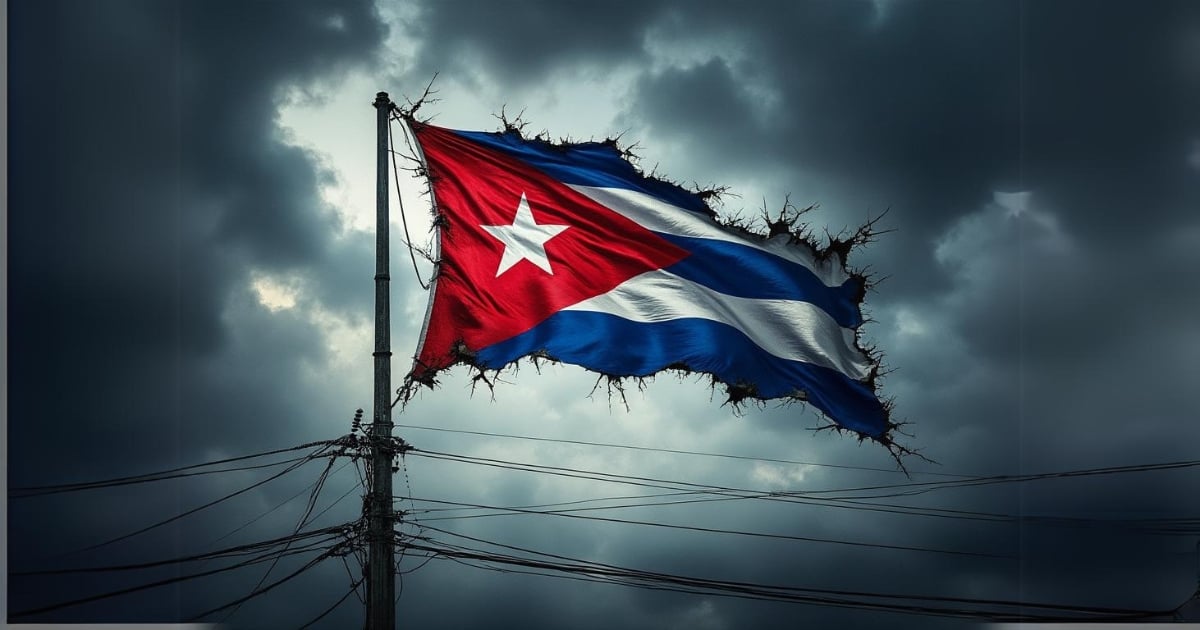
The energy crisis that Cuba is going through has once again revealed the serious deficiencies in the management of the communist government, which has been in power since 1959. The situation of blackouts has become unsustainable, affecting the daily lives of millions of Cubans. The collapse of the electrical system, marked by general blackouts, has left the entire island in a state of emergency that, far from being a novelty, exacerbates a structural crisis that has been dragging on for decades. Despite attempts to justify the situation by blaming the U.S. embargo, various critical voices have pointed out that the problem lies in the lack of planning and the wrong internal decisions made by the government.
A government unable to resolve the energy crisis.
President Miguel Díaz-Canel has insisted on blaming the "reinforced blockade" by the United States as the main cause of the island's energy problems. However, economists like Pedro Monreal have questioned this narrative, emphasizing that what the country faces is not just a "challenge," but a "bankruptcy caused by internal decisions." The lack of effective investments in critical infrastructure, such as the electrical grid, while large sums are allocated to sectors like tourism, has created deep discontent among the population. According to official data, investments in tourism far exceed those allocated to essential areas such as health and social assistance, a fact that has not gone unnoticed by Cubans.
In an attempt to ease the situation, the government announced the suspension of administrative and educational activities for several days, justifying this measure by the necessary work to restore the national electrical system. However, the measure has been met with skepticism and discontent, as there is no short-term solution in sight for the collapse of the electrical system caused by the disconnection of the Antonio Guiteras thermoelectric plant. The situation has become critical, leaving millions of people without electricity and paralyzing many essential activities across the country.
International impact and citizen discontent
Meanwhile, the international press has highlighted the impact of these blackouts on a population that is already facing shortages of food and medicine. Outlets like The New York Times and CNN have reported in real time on the severity of the energy crisis, underscoring the growing frustration of Cubans in the face of a situation that worsens day by day.
In the midst of this crisis, the leaders have resorted to the dismissal of officials such as the governor and vice governor of Las Tunas, claiming "errors committed" in the exercise of their responsibilities. However, these types of measures have been perceived as attempts to divert attention without addressing the structural causes of the crisis. Similar situations have occurred in other provinces, revealing a deep instability in the local administration of the country and its political management.
The popular cry for change in Cuba
On the other hand, the response from the citizens has been overwhelming. Through social media, Cubans have expressed their dissatisfaction with critical messages directed at the leaders, demanding deep changes in the structure of the government. Phrases like "How long?" or "They should go and hand over the country" have multiplied, reflecting a feeling of exasperation at the lack of real solutions. These reactions, although significant, have not been enough to provoke a change in the course of action of the leaders, who cling to the same justifications and measures without acknowledging their mistakes.
In the midst of the energy crisis in Cuba, the voices of public figures and citizens have expressed their discontent and exhaustion over the prolonged blackouts. The vedette Rebeca Martínez shared her resignation on social media, saying she was "in hibernation mode until the light comes back" after several days without electricity. Meanwhile, figures from the artistic world like Yomil Hidalgo and Daniela Reyes lamented the situation, calling it "ugly" and sad, as they observed residents of Havana sitting on the sidewalks waiting for the return of power. In Miami, Willy Chirino, Leoni Torres, and La Diosa sent messages of solidarity, with the latter stating that Cubans are being "slowly killed while alive." Additionally, activist Adelth Bonne shared his experience in Havana, noting that he had lost all his food after 52 hours without electricity, and denounced the constant harassment from police patrols in his neighborhood. In contrast, other Cuban citizens have tried to use humor to cope with the situation, while outrage and concern over the lack of effective solutions spread throughout the country.
In short, the situation in Cuba continues to be alarming, with an electrical system on the verge of collapse, a population facing enormous shortages, and a government unable to provide effective responses. The Cuban leadership, far from acknowledging its mistakes and seeking viable alternatives, continues to resort to justifying narratives that are increasingly convincing less to an exhausted citizenry. Meanwhile, the voices demanding a real and profound change on the island keep increasing.
What do you think?
COMMENTFiled under: